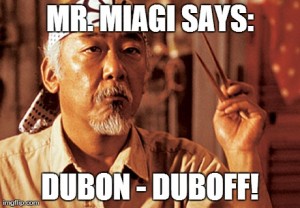WCJ: RFA For Previously Authorized Ongoing Home Care Not Subject to UR
Hello, dear readers! Your humble blogger returns, eager to share with you the wisdom of this pivotal area of law that determines so much in the lives of so many… you guessed it! WORKERS COMP!
So, have you heard of the Miramontes case? Applicant sustained an admitted industrial injury that left him effectively paralyzed from the waist down. His treating physician had recommended home care services to help him perform basic activities of daily living, including getting in and out of bed, getting around, etc. Defendant had been dutifully providing (or paying for) home care services for seven years until around October of 2013, when defendant wrote to the treating physician to have him submit additional requests for ongoing home care authorization.
When the good doctor did not provide a prompt response, even after repeated follow-up by defendant, in March the faucet was turned tightly clockwise (for those of us who grew up with electronic watches, that means they turned the water off). Naturally, applicant had a problem with this. In response to the facsimile reflecting this cut-off, applicant faxed back a prescription from the treating physician to provide home care “full time.”
Defendant then submitted the prescription to UR, and UR promptly denied any home care at all.
The matter proceeded to trial, and the WCJ ruled that defendant must continue to provide home health care (at $560 per week).
Defendant sought reconsideration, which was denied without comment by the WCAB. A writ of review was likewise denied by the Court of Appeal. In his report and recommendation, the WCJ noted “this judge believes that defendant’s unilateral stoppage of medical treatment to force a new prescription for any medical service that an injured worker has needed for seven years is disingenuous and should not be allowed by the [WCAB].”
Now, let your humble blogger begin by saying this issue is not as clear-cut as a “true-believer” from either the applicant or defense bar might claim. I get the defense position completely – we wanted a prescription to make sure that the services are still necessary; and, once we got a prescription, we performed Utilization Review. Additionally, IF it was wrong to threaten to cut off home healthcare after the treating physician failed to respond from October to March, that has little to do with the fact that a prescription was reviewed and failed the UR test.
We saw, for example, the case of McCool v. Monterey Bay where defendant’s UR of pain medication which applicant had been receiving regularly, prompted the WCAB to note that such adherence to the strict letter of the law with respect to UR might warrant an audit, especially when the result is putting an injured worker’s life in peril by suddenly cutting off medication.
In this case, applicant had been using (and, one could say, relying) on home health care for seven years. Without any apparent documentation in change in circumstances, defendant obtained a prescription for the services, and UR then non-certified the treatment.
On the other hand, look at the position the WCJ took in this case: He did not order the defendant to provide medical treatment because UR was untimely. Instead, he looked at the merits of this particular case, and, in these circumstances, found that it was appropriate for the treatment (home healthcare) to continue.
This standard or review is proposed in Senate Bill 563 – if there’s no change in circumstances, the defendant is prevented from re-submitting previously authorized treatment to UR.
But, at this time, that’s NOT the law. Dubon II very clearly spells out that the WCAB has no jurisdiction to determine the validity of a UR determination EXCEPT as to whether it was timely. In fact, your humble blogger has seen a string of cases recently which adhere to Dubon’s holding very closely, and seem to turn a blind eye to the reasoning used by UR.
So what’s different about this one? Why did the WCAB decline to comment or provide analysis? Why was this new exception (previously authorized ongoing care) not adopted or rejected by the Board?
It is well above your humble blogger’s pay grade to find the answer (your generous subscription fees are appreciated, nonetheless), but I suspect it has to do with the facts of this particular case – a treatment that is clearly necessary and, probably, vital on the one hand, and a result on the other hand that is, in your humble blogger’s estimation, procedurally correct.


